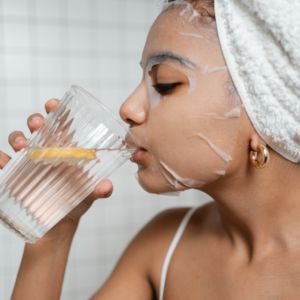What causes spots and blemishes?
There are a number of potential causes for acne and any combination of these may be acting at the same time.
1. Genes play an important role. We know that a strong family history of acne and onset of acne at an early age can predict a more severe or persistent course.
2. Hormones can definitely cause acne to flare up, which is why many women have increased breakouts around the time of their period.
3. Underlying medical conditions such as Polycystic Ovarian Syndrome (PCOS) increase the risk of acne and may be tested for if there are other symptoms to suggest its presence, for example carrying extra weight, thinning of scalp hair, excess body hair and infrequent periods. PCOS has been estimated to affect approximately 8% of women of reproductive age, making it very common indeed.
4. Lifestyle factors can also contribute. Stress, long-wearing makeup and inappropriate skincare product selection almost certainly play a role.
5. There is lots of speculation about the role of diet in acne, but to date, much of this is still unproven. Eating a diet heavy in sugary or high glycaemic index foods has been shown to make breakouts worse in some studies, and emerging evidence suggests that dairy (particularly milk) may be an issue for a certain group of individuals. Claims that eliminating other food groups from the diet will help to banish blemishes are unsubstantiated at present.
We’re confused about all the different terms used to describe spots. Can you explain?
Blackheads, spots and blemishes are all terms used to describe different forms of acne. They are therefore best understood as manifestations of the same condition, caused by excess oil from our sebaceous glands mixing with dead skin cells and getting trapped in our pores, leading to inflammation in the skin.
Acne is recognised by the presence of comedones (blackheads), which are often accompanied by pustules (pus-filled spots). On the more severe end of the spectrum, however, acne can also lead to larger, deeper and more tender spots, which Dermatologists refer to as nodules and cysts. All of these have the potential to leave red or brown marks on the skin, known as post inflammatory hyperpigmentation, as well as scarring which may be indented or raised and firm.
It’s important to note that there are other skin conditions, such as rosacea, that can also cause pimples. If there is something unusual about a rash, it is advisable to seek advice from a Consultant Dermatologist to ensure the correct diagnosis has been made.
Do spots appearing on different areas of the face relate to their cause?
Teenagers often present with increased oil production, blackheads and crops of inflamed pimples in the typical T-zone distribution i.e. across the forehead, on the nose and on the chin. It is possible to have a similar pattern in adulthood, however women in their twenties, thirties and forties tend to suffer more with breakouts on the lower third of the face. The sides of the cheeks, jawline, neck and chin are commonly affected in this group.
There is lots of commentary about different food groups causing breakouts to appear at different locations on the face, but robust data to support these assertions is severely lacking.
What ingredients should we be looking out for if we’re trying to reduce blemishes through skincare at home?
In order to bring acne under control, it is important to stick to your skincare routine as much as possible, remembering to cleanse twice daily and only use non-comedogenic (non pore-blocking) beauty products and makeup.
Adding topical benzoyl peroxide, niacinamide, retinaldehyde or salicylic acid to your routine can help reduce shine, unblock pores by removing dead skin cells and calm redness and inflammation.
If these steps are not enough on their own, the best way to get on top of spots is with prescription therapy from a doctor experienced in treating acne. Retinoid creams, the combined contraceptive pill, antibiotics and more specialised oral treatment options, such as isotretinoin (Roaccutane), may be necessary and should be discussed with a Consultant Dermatologist.
You can check if a doctor is a Consultant Dermatologist by referring to the GMC specialist register here. Click on the search tab at the top right hand side of the page and type in the doctor’s details. If it does not say that the doctor is on the specialist register for Dermatology, then they are not a qualified Dermatologist.
Should you squeeze?
No. Squeezing pimples can lead to scarring and potential infection.
How do you prevent scabbing or scarring?
The most important step in preventing acne scarring is to get the spots under control as early as possible. Once the acne is controlled, the skin has a chance to recover and heal. Much of the redness and texture change will improve, even without any specific intervention, over the following few months.
There are various topical agents and procedures that can enhance the healing process or be used to improve the appearance of scars if they are already established. Topical retinoids, microneedling, laser, chemical peels and surgical scar revision are all possible options. These treatments carry their own risk of adverse effects so need to be carefully tailored to the individual by an experienced practitioner on a case by case basis.
If you are struggling with acne and would like some help to get it under control, please contact the clinic on 02037333225 or email contact@drjustinekluk.com.
© 2020 Dr Justine Kluk. Any redistribution or reproduction of part or all of the contents of this post in any form is prohibited. You may not, except with our express written permission, copy, distribute or commercially exploit the content. Nor may you transmit it or store it in any other website or other form of electronic retrieval system.






